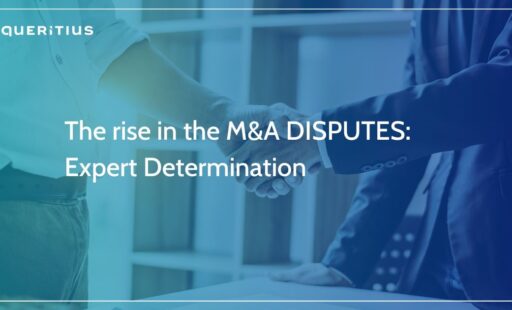The rise in M&A disputes and what to do about it: Expert determination

11. 12. 2023
In our recent practice, Queritius has seen a steady rise in disputes arising from M&A transactions. It is quite a change from the traditional approach of dealmakers, who preferred to avoid legal fights. But as things change, it is becoming important to pay closer attention to the dispute resolution clause you use in deals.
There are 3 major ways of resolving disputes arising from an M&A transaction:
➡️ expert determination
➡️ litigation
➡️ arbitration
Let’s start with expert determination.
It is typically limited to valuation or accounting issues, such as the calculation of the adjusted EBITDA, earn-out or asset value. Expert determination is relatively inexpensive and quick, as it would typically take several weeks or months to be completed. It also involves experts, which presupposes their determination should be on the mark and understandable to the transactions people. But there are three points we want to highlight.
➡️ be careful about the selection process. We have seen SPA provisions requesting the experts to come from a Big Four company. This approach may create problems, as two of them are usually conflicted out as either advisors or auditors to the respective buy and sell sides, and the other two have frequent conflict issues or introduce significant limitations to their instructions. If this happens, it may be difficult for the parties to jointly agree on another expert, and the process may become unworkable.
➡️ expert determination is not recognized by law in most jurisdictions. This means that the outcome produced by the experts will not be considered equivalent to a court judgment or an arbitral award. Accordingly, in order to enforce an expert determination, the winning party would typically have to start arbitration or litigation under the SPA. At the same time, expert determinations are difficult to challenge before a court or a tribunal, who are typically reluctant to review their substance.
➡️ expert determinations are often made based on a limited range of documents, usually specified in the SPAs. This can reduce the time and cost of the process, but it may be grossly inadequate e.g. for the party that intends to rely on forensic evidence to show fraud or inaccuracies in the official records of the target company. The expert, typically a reputable accounting firm with a reputation to preserve, will neither have the skills nor the inclination to engage in that type of dispute. This is an important risk that needs to be considered at the time of the signing of the SPA, especially (for the buyer) if the due diligence of the target had been limited, or (for the seller) if the seller loses access to the company’s records after the transaction.
by Wojciech Sadowski
If you would like to read about the use of litigation in M&A disputes, please watch the space for our next post in the series.
